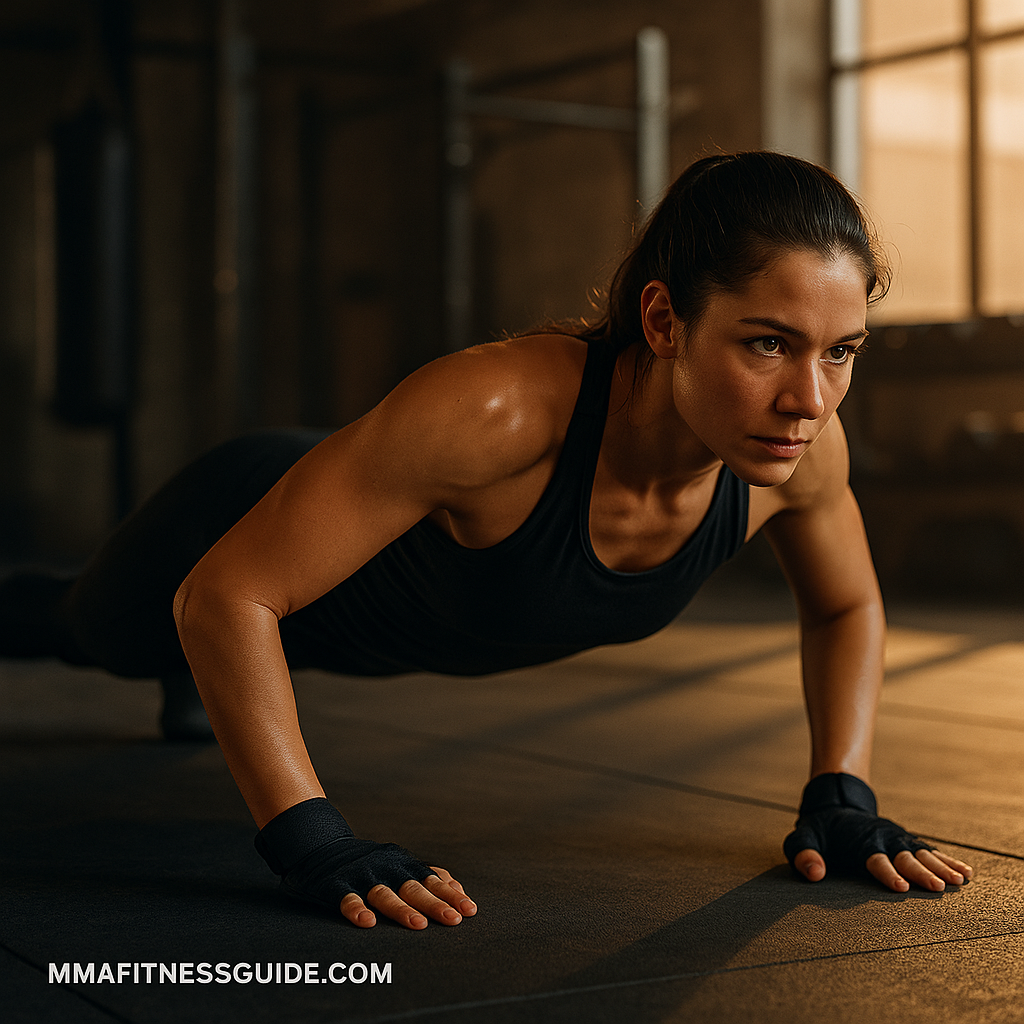
Build Strength Without Weights — Train Like a Fighter
Not every MMA fighter started with a fully equipped gym or expensive gear.
Many built their foundations with bodyweight training — functional movements that develop power, endurance, and balance using only their own body.
These exercises build fighter strength: practical power that translates to striking, grappling, and overall athletic control. Whether you’re a beginner or seasoned athlete, bodyweight training helps you move, react, and recover like a true martial artist.
Why Fighters Use Bodyweight Training
Unlike traditional weightlifting, bodyweight exercises build usable strength — the kind that works dynamically in motion, not just on a bench press.
Key benefits include:
- Improved balance and coordination
- Increased joint stability and flexibility
- Reduced injury risk
- Enhanced muscular endurance and control
- No equipment needed — train anywhere, anytime
Bodyweight training teaches you to control your body as one integrated system — exactly what fighters need in the cage.
1. Push-Ups — Upper Body Power
Push-ups strengthen your chest, shoulders, and triceps, essential for punching power and clinch strength.
How to do it right:
- Keep your hands slightly wider than shoulder-width apart
- Engage your core and keep your body in a straight line
- Lower your chest until it nearly touches the ground
- Push explosively back to the starting position
Progressions:
- Knee push-ups (beginner)
- Diamond push-ups (triceps focus)
- Clap push-ups (explosive power)
2. Pull-Ups — Grip and Back Strength
Pull-ups build upper-back, biceps, and grip strength — crucial for grappling and clinch control.
If you can’t do one yet, start with:
- Assisted pull-ups (use a band or machine)
- Negative pull-ups (focus on slow lowering)
- Inverted rows under a sturdy bar
Once strong enough, aim for 3–4 sets of 6–10 clean reps.
Pro tip: Vary your grip (wide, neutral, chin-up) to hit different muscles and avoid plateaus.
3. Squats — Foundation for Power
Strong legs drive your entire fighting movement — from takedowns to kicks.
How to perform bodyweight squats:
- Feet shoulder-width apart
- Chest up, back straight
- Lower until thighs are parallel to the ground
- Drive up through heels
Progressions:
- Jump squats (explosive strength)
- Single-leg squats (balance and control)
- Pulse squats (muscle endurance)
Squats strengthen your posterior chain — glutes, hamstrings, and quads — the engine behind every movement in MMA.
4. Plank — Core Stability
The plank builds core endurance, helping fighters maintain balance during striking or grappling.
How to do it:
- Forearms on the ground, elbows under shoulders
- Keep your body in a straight line from head to heels
- Engage your abs and glutes
- Hold for 30–60 seconds
Progress to side planks or dynamic variations (plank shoulder taps, plank to push-up).
The goal is not just to hold, but to stay stable while breathing — like you would in a fight.
5. Lunges — Mobility and Balance
Lunges develop hip flexibility and single-leg strength, improving agility and striking balance.
How to perform:
- Step forward with one leg
- Lower until both knees form 90-degree angles
- Keep your front knee above your ankle
- Push back to starting position
Add walking lunges or jumping lunges for intensity. This movement mimics the forward and backward rhythm of fight footwork.
6. Burpees — Total-Body Conditioning
Burpees build explosive endurance — your body’s ability to recover and go again.
How to perform:
- Start standing tall
- Drop into a squat, then place hands on the floor
- Kick your feet back into a plank
- Do a push-up
- Jump explosively back to standing
Burpees combine cardio and strength, mimicking fight-round intensity.
7. Shadowboxing — Controlled Strength and Flow
While not a traditional exercise, shadowboxing builds dynamic strength, balance, and coordination while improving your technique.
Focus on full-body movement — core rotation, stance balance, and shoulder endurance. It’s strength in motion — the fighter’s way.
Sample Bodyweight Workout for Beginners
| Exercise | Duration / Reps | Sets |
|---|---|---|
| Jumping jacks | 1 min | 1 |
| Push-ups | 10–15 | 3 |
| Squats | 15–20 | 3 |
| Plank | 30 sec | 3 |
| Lunges | 10 per leg | 3 |
| Burpees | 8–10 | 2 |
| Shadowboxing | 2 min | 2 |
Repeat the full circuit 2–3 times. Rest 30–60 seconds between exercises.
Key Tips for Success
- Focus on form before speed
- Breathe rhythmically — exhale on exertion
- Increase reps or intensity gradually
- Stay consistent — progress comes with repetition
Remember: you don’t need weights to train like a fighter — just discipline and effort.
